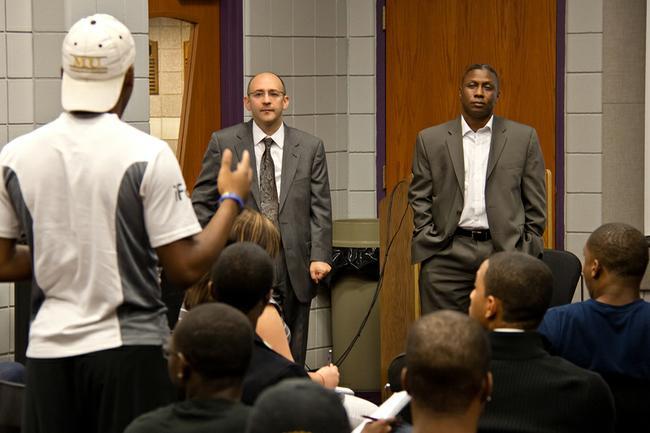
Jamal Andress, Alpha Phi Alpha fraternity, Inc. Zeta Chapter Historian, did not provide answers. He did, however, provide questions. As the facilitator of Wednesday’s “Guilty Until Proven Innocent” event at the Gaines/Oldham Black Culture Center, Andress presented and facilitated a discussion centered on the execution of Troy Davis.
Davis, a black man from Georgia, was found guilty for the 1989 slaying of an off-duty police officer. He was executed Sept. 21 by lethal injection.
“This is important for people to care about because this could be anybody, this could be my family,” Andress said. “My family could get killed, my family could do the killing. It’s the kind of thing where you don’t know that it’s important until it touches you. Because of that, I think you always have to pay some heed when other folks have these issues in their lives.”
Sponsored by the Alpha Phi Alpha Fraternity, Inc., the event drew a crowd, filling every seat in the room and then some. Before presenting the first discussion question, additional information was provided. With the assistance of MU law professors S. David Mitchell and Paul Litton, Andress presented a slideshow delineating various aspects of the case through statistics, history and racial information.
“The statistics that they had really wowed me,” junior LaJoyce Bogan said. “They made me think, ‘Wow, this is real.’ Those statistics kind of backed up the claims that I was going to make tonight as far as the prejudices with the Supreme Court justice system. Seeing those statistics really validated that.”
The presentation was followed by an open question and answer session. Directed toward Mitchell and Litton, the Q and A allowed audience members to receive answers to any misunderstandings or queries they had regarding legal aspects of the case.
“We provided them with some information about the death penalty and the criminal justice system so they can have a better understand what is going on and better evaluate what is happening in the news,” Litton said.
The following discussion centered on one key question: whether the community and human race was past the death penalty.
Guided by Andress, the discussion featured healthy participation from the audience. While some merely stated their opinion, others had a more emotional tie to the issue. One of those was Jaszmin Thomas, whose uncle had been murdered.
“I’m opposed to the death penalty,” Thomas said. “It doesn’t deter anyone, and it’s not right to take another’s life.”
Rather than nitpicking over differing opinions, the discussion evolved into a think tank focused on brainstorming productive solutions to proactively prevent the problem. The group settled on seven solid ideas, including education, outreach, staying informed, not forgetting about similar events, experiencing different cross campus events, involvement and interaction among different races.
“This isn’t a chance to blow off steam and just go back to what we’re doing, this is a chance for us to come up with a solution,” Bogan said. “We have come up with solutions for us to take action, as a Mizzou community, not just black students, not just white students, but as one Mizzou.”